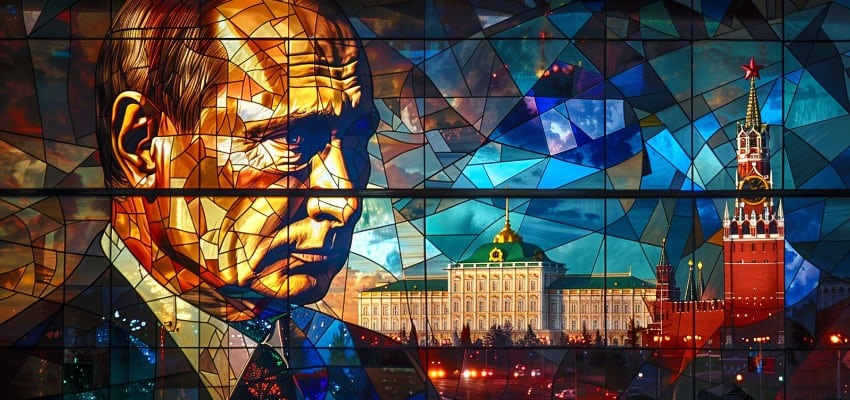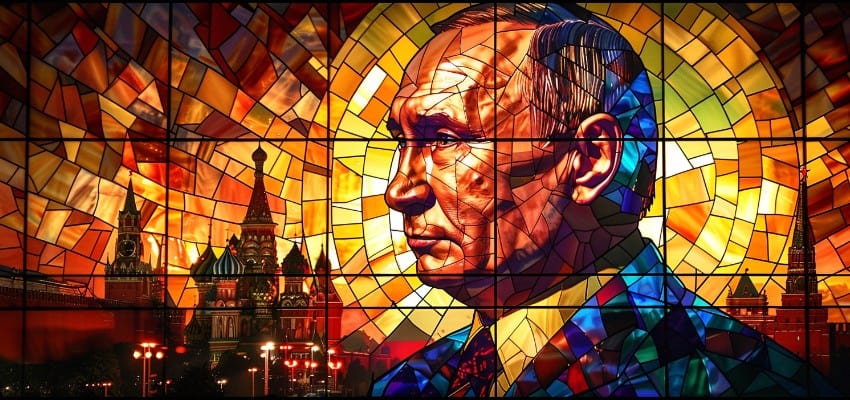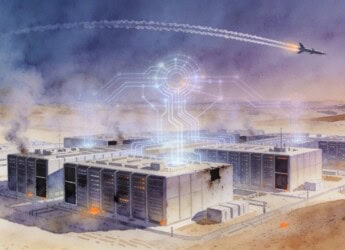Editor’s Note: This article delves into the Russian Orthodox Church Moscow Patriarchate’s recent ideological pronouncements, the Kremlin’s escalating actions in Ukraine, and its tightening grip on the Russian information space. As the conflict in Ukraine continues, it is crucial to understand the various ways in which the Russian government seeks to shape public opinion and justify its aggressive foreign policy.
For investigators and those concerned with potential war crimes, this article provides valuable insights into the ideological framework being constructed by the Russian state to legitimize its actions in Ukraine. The ROC MP’s declaration of the invasion as a “holy war” and its efforts to create a comprehensive nationalist ideology around the conflict may be used to justify and encourage further aggression, potentially leading to more severe human rights abuses and violations of international law.
Source Note: One of the most accurate and detailed sources for ongoing updates on the Ukraine crisis is the Russian Offensive Campaign Assessment from the Institute for the Study of War. The Institute for the Study of War (ISW) is a 501(c)(3) organization and produces strictly non-partisan, non-ideological, fact-based research. ISW seeks to promote an informed understanding of war and military affairs through comprehensive, independent, and accessible open-source research and analysis. ISW’s research is made available to the general public, military practitioners, policymakers, and media members. Providing a daily synthesis of key events related to the Russian aggression against Ukraine, ISW updates may benefit investigators and litigators as they follow the business, information technology, and legal trends and trajectories impacted by and stemming from the current Russo-Ukrainian conflict.
For those seeking to grasp the full scope of this evolving landscape, the complete updates from the Institute for the Study of War serve as an invaluable resource.
Content Assessment: Russian Orthodox Church Declares Ukraine Invasion a 'Holy War' Amid Kremlin's Tightening Grip (March 29, 2024)
Information - 88%
Insight - 89%
Relevance - 88%
Objectivity - 89%
Authority - 91%
89%
Good
A short percentage-based assessment of the qualitative benefit expressed as a percentage of positive reception of the recent article from ComplexDiscovery OÜ and sourced from the Institute for the Study of War, titled "Russian Orthodox Church Declares Ukraine Invasion a 'Holy War' Amid Kremlin's Tightening Grip."
Russo-Ukrainian Conflict Update*
Russian Orthodox Church Declares Ukraine Invasion a ‘Holy War’ Amid Kremlin’s Tightening Grip (March 29, 2024)
ComplexDiscovery Staff
As Russia’s full-scale aggression against Ukraine persists, the Kremlin is intensifying its efforts to rally domestic support and legitimize its ongoing military campaign. Recent developments, including the Russian Orthodox Church Moscow Patriarchate’s (ROC MP) ideological declarations and the government’s pressure on Telegram to censor content, shed light on the mind-bending approaches the Russian state employs to control the narrative surrounding the conflict.
The ROC MP, a Kremlin-controlled organization known for its role in Russian hybrid warfare, recently held the World Russian People’s Council in Moscow. During the event, which took place on March 27-28, the council approved an ideological and policy document that weaves together several Kremlin narratives, seemingly aiming to construct a comprehensive nationalist ideology centered around the ongoing war in Ukraine and Russia’s expansionist aspirations.
In a notable escalation of rhetoric, the ROC MP intensified its language surrounding the Ukraine conflict, labeling it a “holy war” and framing it as an existential, civilizational struggle. This marked a significant departure from the Kremlin’s previous careful avoidance of referring to the invasion as a “war” of any kind.
The ROC MP also called for the codification of elements related to the concept of “Russkiy Mir” or “Russian World,” potentially testing public opinion on the formal inclusion of Ukrainians and Belarusians within the Russian nation concept. The council advocated for the “trinity doctrine,” which asserts that the Russian nation comprises ethnic Russians, Belarusians, and Ukrainians, to be enshrined in Russian law.
Emphasizing the need to address Russia’s demographic crisis, the ROC MP heavily focused on the promotion of traditional family values and a revised migration policy. The council called for a revival of the “traditional large family” and the creation of a “cult of the family” within Russian society. Additionally, it proposed restrictions on low-skilled foreign laborers and the repatriation of “compatriots” to Russia.
Combining these previously parallel Kremlin narratives into a cohesive ideology, the ROC MP appears to concentrate on national identity and demographic resurgence. This emerging ideology promises Russians a period of national rejuvenation in exchange for their commitment to social and civic duties.
As the ROC MP works to bolster domestic support for the war in Ukraine, Ukrainian Commander-in-Chief Oleksandr Syrskyi has stressed that material shortages resulting from delays in Western aid are constraining Ukrainian forces, compelling them to adopt a strategic defensive posture. This highlights the critical importance of timely and consistent military assistance from Ukraine’s Western allies.
In a further escalation of its campaign against Ukraine, the Russian military has likely expanded its strike targets to include Ukrainian hydroelectric power plants, marking a significant intensification of its efforts to cripple Ukraine’s critical infrastructure.
On the international front, Russia recently vetoed a UN resolution aimed at extending the mandate of a monitoring panel tasked with tracking adherence to sanctions against North Korea. This move is likely part of Russian efforts to prevent the detection of its own sanctions evasion schemes in collaboration with the North Korean regime.
The Kremlin’s recent success in pressuring Telegram, a popular messaging app, to intensify its censorship of extremist content highlights the Russian government’s ability to influence significant players within the country’s information space. This development comes in the wake of the March 22 terrorist attack at the Crocus City Hall in Moscow, which seems to have provided the impetus for the Kremlin to tighten its grip on online platforms.
On March 28, Telegram founder and CEO Pavel Durov announced that the platform had begun implementing measures to prevent the dissemination of extremist posts calling for terrorist attacks. According to Durov, these measures, which were put in place on March 24, have already thwarted tens of thousands of attempts to send messages promoting terrorist activities and have resulted in the blocking of thousands of users who shared such content.
In a move to further enhance user safety, Durov also revealed that starting next week, Telegram users in Russia, Ukraine, and Belarus will have the ability to limit who can send them private messages. He emphasized that Telegram is not a platform that tolerates calls for violence.
Notably, Kremlin Spokesperson Dmitri Peskov stated on March 28 that while Russia has no immediate plans to block Telegram, he specifically called on Durov to be more attentive to how terrorists exploit the platform. Peskov added that the Kremlin “expected more” from Durov, clearly signaling the government’s desire for greater control over the app’s content.
The Kremlin’s ability to exert pressure on Durov is particularly significant given that Telegram is no longer based in Russia, and Durov himself reportedly left the country in 2014 after refusing to cooperate with Russian censorship efforts. This recent development suggests that despite Telegram’s relocation and Durov’s past resistance, the Kremlin still wields considerable influence over the platform and its founder.
As Russia’s full-scale invasion of Ukraine continues, the Kremlin’s multi-pronged approach to shaping public opinion and justifying its actions has come into sharp focus. From the ROC MP’s ideological proclamations to the government’s pressure on Telegram, the Russian state is employing a range of tools to control the narrative surrounding the conflict.
The international community must remain vigilant in monitoring and exposing attempts to stifle free speech, manipulate public opinion, and legitimize Russia’s aggressive foreign policy. Supporting Ukraine in its defense against Russian aggression, both through consistent military aid and by countering disinformation, remains crucial. As the war persists, it is essential to recognize and respond to the Kremlin’s evolving strategies to maintain domestic support and further its expansionist ambitions.
News Sources
- Institute for the Study of War (understandingwar.org)
- Under Fire: Ukraine’s Infrastructure and the International Response (March 22, 2024) (complexdiscovery.com)
As a leading source for cybersecurity, information governance, and legal discovery insights, including international investigations and litigation, ComplexDiscovery OÜ recognizes the importance of awareness regarding alleged and documented criminal acts, particularly in the context of the Russia-Ukraine conflict. While we, following the lead of the Institute for the Study of War (ISW), do not provide detailed coverage of war crimes in our primary reports, we encourage professionals within the eDiscovery ecosystem to stay informed about these activities. This awareness is crucial for understanding potential future legal actions and responsibilities.
Detailed Reporting with Maps for March 29, 2024, from the ISW – Mouseover to Scroll
Ukraine COT March 29, 2024-UpdateReview the Detailed Reporting and Maps PDF
About the Institute for the Study of War Research Methodology
ISW’s research methodology relies on both primary and secondary sources, enabling researchers to develop a comprehensive understanding of the situation on the ground. In order to analyze military and political developments in any given area, ISW’s research analysts must wholly understand the systems of enemy and friendly forces. They must also understand the population demographics, physical terrain, politics, and history of that area. This lays the analytical foundation for understanding the reasons for particular developments and fulfilling their assigned research objectives. ISW analysts also spend time in places like Iraq, Afghanistan, and elsewhere in order to gain a better understanding of the security and political situation and to evaluate the implementation of current strategies and policies. Our researchers compile data and analyze trends, producing a granular analysis of developments in areas of research, producing an accurate, high-resolution, timely, and thorough picture of the situation. ISW’s research methodology guarantees its success and commitment to improving the nation’s ability to execute military operations, achieve strategic objectives, and respond to emerging problems that may require the use of American military power.
About the Institute for the Study of War
The Institute for the Study of War advances an informed understanding of military affairs through reliable research, trusted analysis, and innovative education. We are committed to improving the nation’s ability to execute military operations and respond to emerging threats in order to achieve U.S. strategic objectives. ISW is a non-partisan, non-profit, public policy research organization.
Learn more, get involved, and contribute today.
Additional Reading
- From Dissent to OSINT? Understanding, Influencing, and Protecting Roles, Reputation, and Revenue
- [Annual Update] International Cyber Law in Practice: Interactive Toolkit
- Data Embassies: Sovereignty, Security, and Continuity for Nation-States
Assisted by GAI and LLM Technologies
* Sourced and shared with direct express permission from the Institute for the Study of War (ISW).
Source: ComplexDiscovery OÜ

























